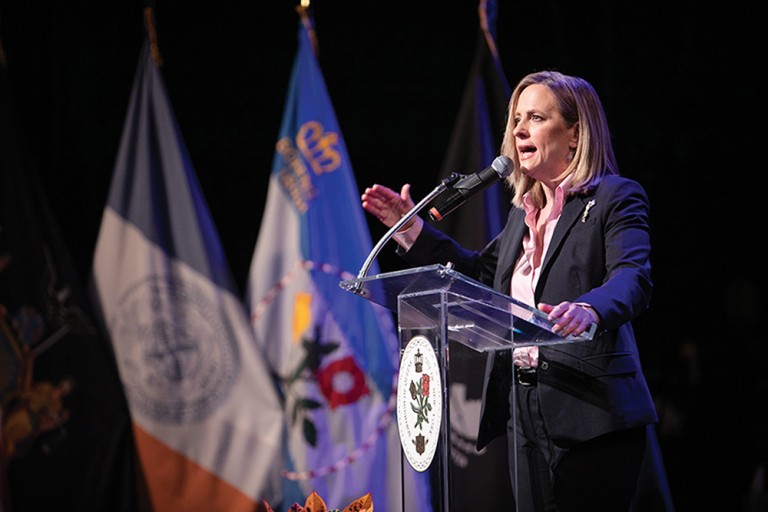By Forum Staff
Queens District Attorney Melinda Katz filed motions today with defense attorneys to vacate three wrongful convictions.
In each case, new evidence came to light:
- In the case of Earl Walters, fingerprint evidence implicates other men in the 1992 abductions and robberies of two women for which Walters served 20 years in prison.
- A review of the case of Armond McCloud and Reginald Cameron found that their confessions in the 1994 shooting death of Kei Sunada were unreliable because they were elicited by a detective connected to two cases involving false confessions – the “Central Park Five” rape case in 1989 and the murder in 1990 of a tourist in town to attend the U.S Open tennis tournament.
District Attorney Katz said: “Fairness in the criminal justice system means we must re-evaluate cases when credible new evidence of actual innocence or wrongful conviction emerges. Those who have served prison time for crimes they demonstrably did not commit deserve to have the slate wiped clean.”
“I want to thank the New Jersey Innocence Project at Rutgers University, the Center on Wrongful Convictions at Northwestern University’s Pritzker School of Law, the Exoneration Initiative and the Legal Aid Wrongful Conviction Unit for their work on these cases with our Conviction Integrity Unit,” District Attorney Katz added.
Queens Supreme Court Justice Michelle A. Johnson granted the motions and dismissed the indictments.
Examples of Wrongful Convictions: People v. McCloud and People v. Cameron
Kei Sunada, 22, a Japanese national, returned to his home at the Columbia building in Lefrak City on August 4, 1994, at about 11:15 p.m. About five minutes later, a tenant reported hearing shots fired and Sunada was found by a LeFrak City peace officer on the landing of a fourth-floor stairwell with a gunshot wound to the head. He died three days later.
Initial NYPD paperwork contained significant errors. Detective Carlos Gonzalez inaccurately reported that Sunada was found lying face down in a pool of blood in a fourth-floor hallway, not the stairwell. Another officer incorrectly noted that Sunada was shot twice, not once.
Armond McCloud, who was 20 years old at the time, and Reginald Cameron, who was 19, became suspects after a 16-year-old being questioned in an unrelated robbery told police that he overheard “people saying” that someone who fit McCloud’s description killed Sunada.
McCloud and Cameron were arrested without probable cause at around 7:00 p.m. August 8. They were interrogated for several hours without counsel by multiple detectives. At around 3:30 a.m. the next morning, some eight-and-a-half hours after his arrest, Cameron signed a written confession while being interrogated by Detective Gonzalez.
Detective Gonzalez then took over questioning McCloud and obtained a confession at around 4:30 a.m. Both Cameron and McCloud gave video-taped statements later that day with Detective Gonzalez present. Both men’s confessions described a robbery in a fourth-floor hallway. McCloud’s said the gun accidentally discharged when Sunada struck his hand with a defensive karate kick.
The confessions, however, did not match the facts of the crime and did not accurately describe the victim. The inaccuracies in the confessions mirrored errors in the police reports.
McCloud and Cameron both later recanted, arguing that their confessions were coerced. McCloud said he falsely confessed because he was hungry and thirsty and believed his innocence would come to light in court. Cameron described coercive interrogation techniques in pretrial hearing testimony.

